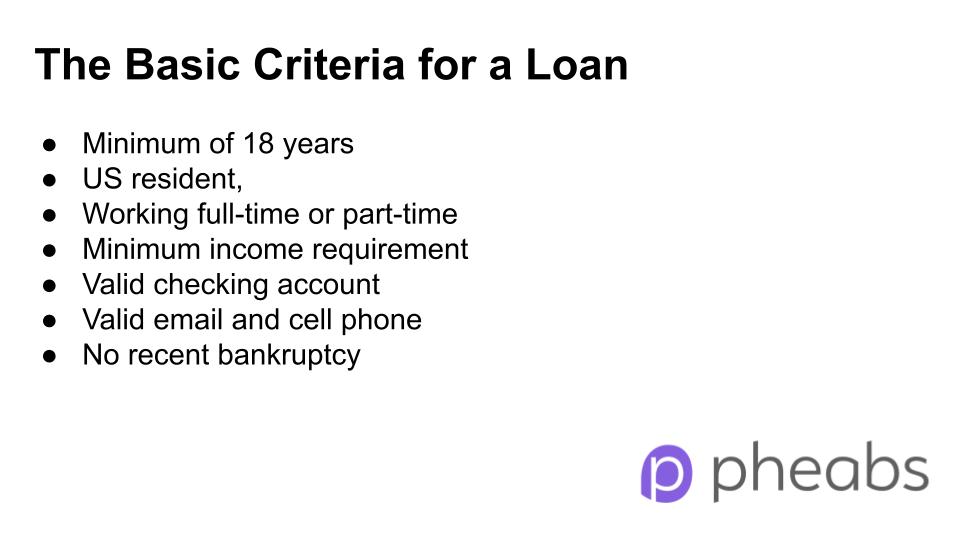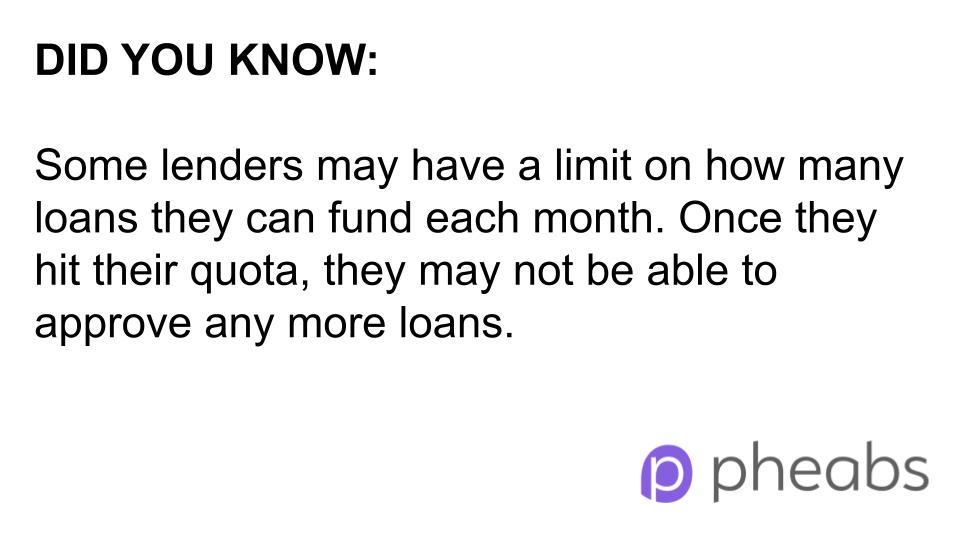Your loan application can be declined, denied or rejected for a number of reasons including not meeting the basic requirements in terms of income, credit score, because you have other outstanding loans or simply because the lender does not have the capacity to lend any more that month.
At Pheabs, we understand how frustrating it can be when you need to borrow money and find that your loan application has not been accepted – whether it is for a credit card, personal loan or mortgage.
If you are thinking “i need a loan but keep getting declined”, then keep reading! With this in mind, we aim to shed some light as to why your loan enquiry might have been denied and what options you have available to you.
Reasons My Loan Application Has Been Declined
- Not meeting the basic criteria
- Credit score
- Income
- Affordability and debt-to-loan ratio
- Other trust factors
- Lender does not have the capacity to lend out more
Not Meeting The Basic Criteria
Every US lender, whether personal loans, title loans or payday loans, will have a minimum criteria that you will need to be eligible for to apply.
This is usually being a minimum of 18 years, US resident, working full-time or part-time, a minimum income requirement, a valid checking account, valid email and cell phone and no recent bankruptcy.
This criteria may vary from lender-to-lender and whilst you might meet this initially, some might be more strict in terms of your minimum monthly income and also for those who are on welfare, self-employed and have not been employed for long than a few weeks or months.
However, if you do not meet this basic criteria, your loan application is likely to get declined early on.
Not Meeting The Minimum Credit Score Requirements
When applying for most loans, the lender will carry out a credit check to get an idea of your credit history and how well you have paid off other financial obligations in the past including credit cards, loans, utility bills, cell phone bills and more.
Most loan underwriting systems are automated, with a set of rules already built in. So first you will need to meet the initial criteria (see above) and then the lender will run a credit check and this will all happen pretty much instantly.
The lender’s minimum credit score requirement might be set to a certain amount e.g 600 or 700 – and if you are stronger than this, you can pass to the next stage, but alas, if your score is below this, your loan will probably be declined.
This is not always written in stone. Since being older, a homeowner and having a mortgage are important trust attributes – and the lender could give these more weighting in cases, despite a lower than average credit score. But the rule of thumb is that you will usually need good or fair credit for products such as mortgages, personal loans and credit cards.
Your Income is Not High Enough
Your income is an important feature when determining your eligibility for a loan, since it is going to be the main way to repay your loan. The lender needs peace of mind that you are earning a regular income and that it is high enough.
You may find that some lenders require your earnings to be a minimum of $800 or $1,000 per month and some will allow you to be employed part-time and only earning $500 per month – but this could vary from lender-to-lender.
The lender considers that you have a monthly income, but will have other financial commitments such as rent, food, transport, so they will need to calculate how much you can borrow against your income and other outgoing expenses. By asking to borrow too much money, the lender could think that you are living beyond your means and decline you outright.
Affordability and Debt-to-Loan Ratio
When applying for a loan, the lender will look at your affordability and debt-to-loan ratio – and this considers how much you can afford to borrow compared to what you can afford to repay.
So if you have applied for a loan, your monthly income may be able to cover it, but when it comes to affordability, you may have too many other outstanding obligations or other loans open. So even though you have borrowed $500 or $1,000, the lender may consider how well you can afford your loan if also have to pay credit cards, rent and two other loans each month.
In some cases, the lender will decide that you cannot afford it and that is why your loan is declined.
Otherwise, they may adjust the loan size you have requested and even though you have asked for $1,000, they might say that the maximum you can borrow right now is $500 or $600.
Other Trust Factors – Are Your Details Correct?
When applying, the lenders will be able to pick up on anything that looks strange in your enquiry – and these can be reasons why your loan application is declined.
This includes:
- Name and date of birth do not match up
- Name and address do not match up
- Name and email address and vastly different
- Have made multiple applications in a short space of time – maybe using slightly different details
- Income is exaggerated or too high
When running a credit check, the lender is able to access basic information such as your full name, address and date of birth – so if you have put in false information, this will likely be flagged on their system.
It is common for some borrowers who have been declined to re-apply again and again, slightly changing their details to game the system. However, this is likely to be picked up and raise warning signs and this can be a very simple way to get declined.
You are always better off giving your real and true details and not trying to bend the truth.
The Lender Does Not Have The Capacity To Lend Out More
A very interesting and unexpected reason why your application can be declined is because the lender cannot grant any more further loans that month.
Lenders are businesses after all, and they do not necessarily have unlimited funds. Some loan companies may have a certain number of loans they can distribute each month (e.g 100 or 5,000) or perhaps they can only afford to lend out a certain sum (e.g $1 million)
So what happens is that lenders may have a stricter or looser criteria depending on their targets or access to funding that month. You may find that despite being a good candidate that the lender simply cannot fund any more than month, or they are very strict and only approving the very best customers.
So it can be luck of the draw – you could get lucky because of the lender’s requirements or be rejected on the basis that they are not funding.
To manage their lending quotes, the loan companies may just adjust their credit score minimums and you need to be at a certain level to be approved. You may also find that lenders are more lenient at the beginning of the month and stricter at the end of the month due to reaching their targets – or visa versa.
Are Some US States Stricter Than Others?
Yes, this may certainly be the case. Since some states such as Texas and Nevada have no laws on how many loans outstanding you can have, but some states such as Ohio and Illinois will immediately decline you if you already have one payday loan outstanding.
There are of course a number of States where payday lending is not legal, such as New York, Boston and Nebraska.
What Can I Do If My Loan Has Been Declined? How Can I Boost My Chances of Approval?
Do:
- Consider alternatives, such as borrowing from family and friends or from a credit union (which are both very low cost)
- Consider ways to improve your credit score. Can you pay off any existing bills? Close down any credit cards or store cards that you do not use?
- Speak to the lender and ask for feedback
Do Not:
- Keep applying again and again – this will not improve your chance
- Give false information to game the system of the lender – their technology is sophisticated and will pick up on this in a second
- Use someone else’s details to apply – again, the lender will pick up on it
You can also consider using a loans connection service such as Pheabs – since we take your enquiry and match it with more than 30 lenders and connect you to the one who is most likely to approve you. Our panel of lenders changes regularly to reflect who is actively funding and accepting new applications. With no upfront fees, we are pleased to help you get the funds you need. To get started, you can apply here >>






